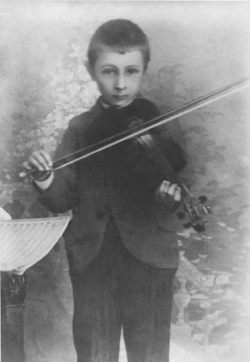
Composer Bohuslav Martinu had a remarkably inauspicious start in life: He was born in a church tower in Bohemia, which the town had granted to his father, a sexton. A sickly child, he often had to be carried up the 143 stairs on his father’s back. He was shy, reticent, and physically uncoordinated. “It would be hard to imagine a more unpromising environment for a child composer, for there was no significant musical tradition within the family and for several years he hardly ever ventured from the tower,” writes Barry Cooper in Child Composers and Their Works.
He excelled in violin, but since manuscript paper wasn’t available to him it’s not clear how many of his early compositions have been lost. When he ventured to the Prague Conservatory in 1906, he offered a three-movement string quartet that he’d written at age 10. He hadn’t even learned the alto clef, and used the treble clef instead for the viola part.
His mother said that the director “was so impressed by Bohus’ composition that at first he doubted whether the score was my son’s own work, and asked who had helped him.” But no one in his village would have been skillful enough to do so.
They accepted him, and he went on to a distinguished international career, writing six symphonies, 15 operas, 14 ballet scores, and a wide range of orchestral, chamber, vocal, and instrumental works.
